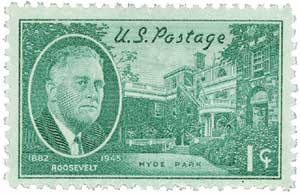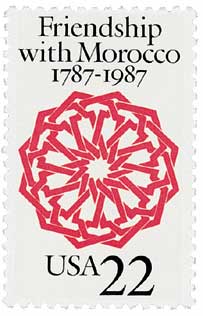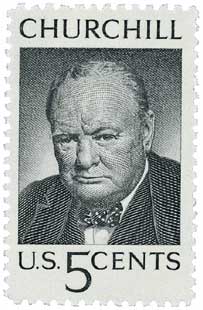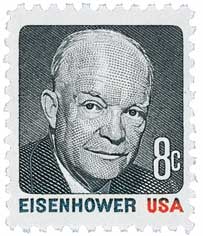
1¢ FDR and Hyde Park
City: Hyde Park, NY
Quantity: 128,140,000
Printed by: Bureau of Engraving and Printing
Printing Method: Rotary Press
Perforations: 11 x 10.5
Color: Blue green
Casablanca Conference

On January 14, 1943, Allied leaders met in Casablanca, Morocco, to discuss the next stage of World War II.
The conference was a secret. Days before the meeting, President Franklin Roosevelt boarded a train going north to make journalists think he was going to his upstate New York estate. Instead, he secretly switched trains in Baltimore and rode down to Miami to catch a plane. This made Roosevelt the first president to fly in an airplane while in office, and the first to leave American soil during wartime.

From there Roosevelt had a long journey ahead of him – 10 hours to Trinidad and Tobago, nine hours to Para River, Brazil, 19 hours over the Atlantic to the Gambia, and 11 hours to Casablanca. He finally arrived on the evening of January 14, five days after leaving the White House. That night Roosevelt and Winston Churchill stayed up until 3 am discussing strategy.
Also present at the conference were Charles de Gaulle and Henri Giraud. Joseph Stalin had been invited, but he declined because he had to focus his attention on the ongoing Battle of Stalingrad.

The main purpose of the conference was for Roosevelt and Churchill to plan their military strategies for the next year. They planned to have their militaries draw Germany away from the Eastern Front, and would increase the number of supplies they were sending to the Soviet Union. They also decided to launch an invasion of Sicily, with the goal being to remove Italy from the war. At the same time, the Allies would start assembling troops in England for a landing in Northern France.

Additionally, the Allies would also increase their strategic bombing against Germany. In the Pacific Theater, they agreed on a plan to remove Japan from Papua New Guinea and open up new supply lines to China through Burma. They also agreed to name Dwight D. Eisenhower Supreme Commander of Allied Forces.
One of the major outcomes of the conference was the decision that the only way to ensure peace after the war was to institute a policy of unconditional surrender. Roosevelt said that the policy was not intended to destroy the populations of the Axis powers, but instead “the destruction of the philosophies in those countries which are based on conquest and the subjugation of other people.”
1¢ FDR and Hyde Park
City: Hyde Park, NY
Quantity: 128,140,000
Printed by: Bureau of Engraving and Printing
Printing Method: Rotary Press
Perforations: 11 x 10.5
Color: Blue green
Casablanca Conference

On January 14, 1943, Allied leaders met in Casablanca, Morocco, to discuss the next stage of World War II.
The conference was a secret. Days before the meeting, President Franklin Roosevelt boarded a train going north to make journalists think he was going to his upstate New York estate. Instead, he secretly switched trains in Baltimore and rode down to Miami to catch a plane. This made Roosevelt the first president to fly in an airplane while in office, and the first to leave American soil during wartime.

From there Roosevelt had a long journey ahead of him – 10 hours to Trinidad and Tobago, nine hours to Para River, Brazil, 19 hours over the Atlantic to the Gambia, and 11 hours to Casablanca. He finally arrived on the evening of January 14, five days after leaving the White House. That night Roosevelt and Winston Churchill stayed up until 3 am discussing strategy.
Also present at the conference were Charles de Gaulle and Henri Giraud. Joseph Stalin had been invited, but he declined because he had to focus his attention on the ongoing Battle of Stalingrad.

The main purpose of the conference was for Roosevelt and Churchill to plan their military strategies for the next year. They planned to have their militaries draw Germany away from the Eastern Front, and would increase the number of supplies they were sending to the Soviet Union. They also decided to launch an invasion of Sicily, with the goal being to remove Italy from the war. At the same time, the Allies would start assembling troops in England for a landing in Northern France.

Additionally, the Allies would also increase their strategic bombing against Germany. In the Pacific Theater, they agreed on a plan to remove Japan from Papua New Guinea and open up new supply lines to China through Burma. They also agreed to name Dwight D. Eisenhower Supreme Commander of Allied Forces.
One of the major outcomes of the conference was the decision that the only way to ensure peace after the war was to institute a policy of unconditional surrender. Roosevelt said that the policy was not intended to destroy the populations of the Axis powers, but instead “the destruction of the philosophies in those countries which are based on conquest and the subjugation of other people.”











